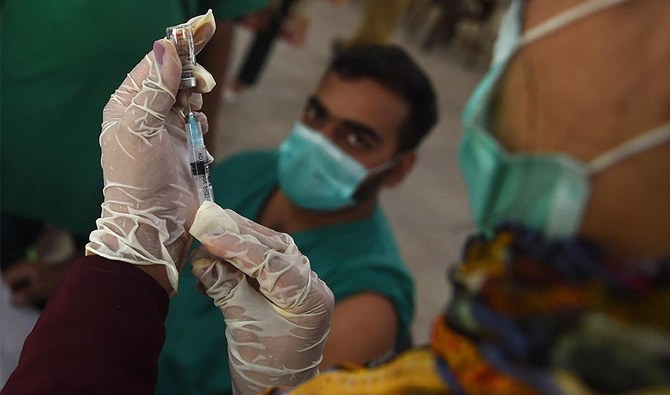ISLAMABAD/LAHORE: The Pakistani capital is leading in the country in administering COVID-19 vaccines to its eligible population, with health ministry data up until September 30 showing that over 85 percent percent of people in Islamabad had received a first dose and 47 percent were fully vaccinated, while only 15 percent of the target group in the country’s least populous province of Balochistan had as yet been administered one jab.
The government of Prime Minister Imran Khan launched a national vaccination drive in February this year, prioritizing health care workers and elderly citizens before broadening the campaign to the public. Now in the fourth wave of the pandemic, Pakistani officials say a ramped up vaccination campaign has helped to push daily infection rates down from a peak of over nine percent in August to less than two percent currently.
Around 125 million of Pakistan’s 220 million total population is eligible to receive a coronavirus vaccine. Among the eligible population, around 90 million have received at least one dose since February, health ministry data shows.
As of Monday this week, fully vaccinated Pakistanis constituted 26 percent of the target population, with all federating units saying they were ramping up efforts to boost daily vaccination rates by launching door-to-door campaigns and forbidding unjabbed people from using public transportation, air travel, buying fuel at petrol stations and availing other essential services.
“COVID-19 vaccination has helped us reduce severity of disease and hospitalization rates among those infected with the virus in Islamabad,” Dr. Hasan Orooj, Director General Health Services in Islamabad, told Arab News, saying the administration was vaccinating eligible people at public transport stands, weekly bazaars and public and private offices also.
“We [Islamabad] are well ahead of our [vaccination] target, but still people should continue to follow health guidelines to prevent the next wave,” Orooj cautioned, adding that his teams were also working to bridge a existing vaccination gap between rural and urban areas of the capital.
“The vaccination numbers in Islamabad’s rural areas are comparatively low, and we are mobilizing our special teams to bring it at par with urban areas,” he said.
According to official data collected by Arab News from all four provinces and Islamabad, the impoverished Balochistan province has the lowest vaccination rates, with only seven percent of the province fully vaccinated and 15 percent partially jabbed. The province is Pakistan’s largest — it makes up over 40 percent of the total land area of Pakistan — but least populous.
Statistics show a total of 1.25 million individuals — including people from other cities — had received at least one dose of a vaccine in Islamabad as of last week, though only 686,905 people had been fully vaccinated.
Islamabad’s eligible population for the COVID-19 vaccination is about 1.46 million, of which 47 percent is fully vaccinated, health department data showed.
PUNJAB
In Punjab, 45 percent people are partially vaccinated, followed by 39 percent in Khyber Pakhtunkhwa province, 35.53 percent in Sindh and 15 percent in Balochistan.
Punjab Health Secretary Imran Sikandar Baloch said approximately 233 million people in the province had been administered a first dose, while a second dose had been administered to more than 10 million people.
“Punjab is leading the national vaccination drive both in numbers and percentages,” Baloch said.
Sharing the vaccination data of major cities in the province, the secretary said 58 percent of Rawalpindi’s population had been administered the first dose, 53 percent of Multan’s, 51 percent of Lahore’s, 52 percent of Gujranwala’s and 41 percent of Faisalabad’s.
The districts of Jhelum and Mandi Bahauddin had partially vaccinated 69 percent and 62 percent eligible individuals respectively, the secretary said.
To boost inoculation numbers, Baloch said the provincial government had devised door-to-door campaigns especially in rural and hard-to-reach areas.
“We have also decided to target small populated units with mobile vaccination centers,” he added.
SINDH
In Sindh province, 35.53 percent of 34.8 million eligible individuals had been partially vaccinated, according to the health department. The number of those who had received at least one dose in the province stood at 12.4 million while 5.4 million were fully vaccinated, according to official data compiled until Thursday.
Data from the different divisions of Sindh showed Karachi division was 42.81 percent partially vaccinated, Hyderabad division 29.68 percent, Sukkur division 26.03 percent, Mirpur Khas division 48.94 percent, Shaheed Benazir Abad division 34.06 percent and Larkana division 24.54 percent.
Sindh had administered 150,000 vaccines per day on average in the last two weeks in Sindh province, Mehar Khursheed, a spokesperson for the Sindh Health Department, said.
Sindh is home to Pakistan’s port city of Karachi, the nation’s financial hub, where the vaccine rate is higher than in other parts of the province.
Khursheed said the vaccination rate was high in urban districts due to high awareness among people, while the district administration was strictly implementing an obligatory vaccine regime to improve vaccination numbers in low-performing districts.
“Sindh is the first province that has taken bold steps in terms of the obligatory regime to increase in vaccination coverage like blocking mobile phone SIMs, banning commercial activities and travel by unvaccinated people,” Khursheed told Arab News.
KHYBER PAKHTUNKHWA
In Khyber Pakhtunkhwa province, authorities have partially vaccinated around 39 percent of its target population. Overall, more than nine million people from the northwestern province had received a first dose while 3.2 million were fully vaccinated, according to the provincial health department.
Dr. Niaz Muhammad, Director General KP health, said some districts such as Abbottabad, Haripur, Mansehra, Chitral, Orakzai, Peshawar and Kurram had good vaccination results but poor awareness continued to fuel vaccine hesitancy and low immunization rates in other areas.
“We are sending outreach teams in view of reluctance among some people and carrying out mass door-to-door vaccination,” Muhammad told Arab News. “People had some concerns due to some media reports coupled with poor awareness but we’re working to improve our communication strategy.”
In addition, he said the government had already announced an obligatory vaccine regime under which the transport sector and school children would need to have received one COVID-19 dose by October 15.
BALOCHISTAN
In Balochistan, official data showed that around 1,482,791 people had been vaccinated in 33 districts of the province between February and September.
Dr. Naqeeb Niazi, Deputy In-charge Operation Cell Primary and Secondary Health Department in Balochistan, said first dose coverage in the province had reached up to 15 percent while only seven percent were fully vaccinated — the lowest vaccination rate in the country.
“We have been implementing an obligatory regime of vaccination from October 1, and hope the vaccination number will increase in districts with low numbers by October 31,” Niazi told Arab News.
A senior official at the National Command and Operation Center (NCOC), Pakistan’s federal pandemic response body, said vaccination rates varied “because of the peculiar environment and population of every province.”
“Punjab is leading the vaccination drive among provinces because it is the most populated territory in the country,” he said, declining to be named. “Similarly the low turnout in Balochistan is due to its geographic location, not because of less government motivation to vaccinate the provincial population.”
He said people in the remote, sparsely populated Balochistan province had to travel long distances to reach vaccination centers, while lack of awareness and misinformation also continued to fuel low rates in the region.
“Vaccination numbers are usually low in rural areas of the country for different reasons, including low motivation and luxury to avoid government-imposed restrictions because they don’t need to travel by air or go to restaurants for which it is mandatory to get vaccinated now,” the official said.
- Additional reporting by Naimat Khan in Karachi, Rehmat Mehsud in Peshawar and Saadullah Akhter in Quetta
85% of capital city partially jabbed against COVID-19, only 15% of Pakistan’s largest province — data
https://arab.news/wrxww
85% of capital city partially jabbed against COVID-19, only 15% of Pakistan’s largest province — data

- Arab News gathers vaccine data from Islamabad and four provinces, all figures are with respect to eligible population until September 30
- Fully vaccinated Pakistanis constituted 26 percent of target population of 125 million, 47 percent people in Islamabad fully jabbed
Pakistan PM congratulates Joseph Aoun on election as new Lebanon president

- Aoun’s election came weeks after a ceasefire deal halted a 14-month conflict between Israel, Lebanese group Hezbollah
- PM Shehbaz Sharif says Pakistan values its ties with Lebanon and looks forward to strengthen bilateral cooperation
ISLAMABAD: Prime Minister Shehbaz Sharif on Friday congratulated Joseph Aoun for being elected as the new president of Lebanon, expressing Pakistan’s interest in strengthening bilateral cooperation between both countries.
Aoun’s election came weeks after a tenuous ceasefire agreement halted a 14-month conflict between Israel and the Lebanese militant group Hezbollah and at a time when Lebanon’s leaders are seeking international assistance for reconstruction.
Aoun, no relation to former President Michel, was widely seen as the preferred candidate of the United States, whose assistance Lebanon will need as it seeks to rebuild.
In his message on X, Sharif wished Aoun success in his endeavors to lead Lebanon toward peace, stability and prosperity.
“Pakistan values its ties with Lebanon and looks forward to strengthen our bilateral cooperation,” the Pakistan prime minister said.
Pakistan and Lebanon share close relations. In December, Lebanon helped Islamabad safely evacuate around 300 Pakistani nationals stranded in Syria and transport them back home via chartered flights from Beirut.
Pakistan has also sent several relief consignments for the people of Lebanon during Israel’s bombardment of the Middle Eastern country.
Pakistan records 5.6% increase in remittances month on month
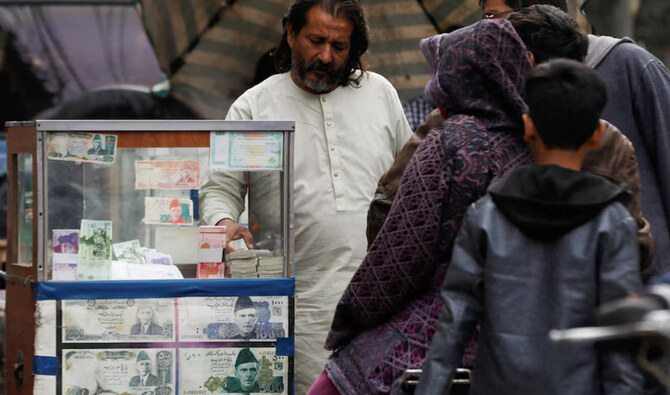
- Overseas workers remittances stood at $3.1 billion in the month of December
- The inflows rose by 29.3 percent in 2024 as compared to the previous year
ISLAMABAD: Pakistan recorded a 5.6 percent increase in remittances in December on a month-on-month basis, Prime Minister Shehbaz Sharif said on Friday, congratulating the nation on the record inflows.
Remittances bring billions of dollars annually from overseas Pakistanis and are vital to Pakistan’s economy. These inflows bolster foreign exchange reserves, stabilize the balance of payments, and support the Pakistani currency.
Overseas workers remittances stood at $3.1 billion in the month of December, according to a statement issued from Sharif’s office. The inflows rose by 29.3 percent in 2024 as compared to the previous year.
Sharif said the record increase in remittances was a testament to the determination of overseas Pakistanis to play their role in the development of the South Asian country.
“After economic stability, Pakistan has embarked on the path of economic development,” he said.
Pakistan narrowly avoided a sovereign default in 2023 by clinching a last-gasp $3 billion loan program from the International Monetary Fund (IMF).
The South Asian country has since made some economic gains, most notably slowing the annual consumer inflation to 4.1 percent in December. This was down from 38 percent in May 2023.
Pakistan’s government has vowed to undertake economic reforms mandated by the IMF which include tightening fiscal policies, privatizing loss-making state-owned enterprises and enhancing tax revenues.
“The government of Pakistan is committed to the country’s development and public welfare,” Sharif reassured in his statement.
Pakistan to launch pilot motorbike patrol for security of motorways

- Motorways in Pakistan have a dedicated police force, but various crimes, including rapes, have been reported in the past
- Communications minister says 30-35 motorbikes will boost motorway security and improve response time in the first phase
ISLAMABAD: Pakistan’s Communications Minister Abdul Aleem Khan has ordered the launch of a pilot motorbike patrol to enhance security of motorways in the country, Pakistani state media reported on Thursday.
Pakistan’s motorway network has improved road connectivity for the people and the government has deployed a dedicated motorway police force, installed CCTV cameras and established emergency response systems, but security concerns have persisted for travelers.
In 2020, the gangrape of a woman traveling from Lahore to Gujranwala via the M-11 motorway in front of her children sparked widespread outrage in the country, leading to calls for enhanced security measures. In 2023, a motorway police officer was also arrested on allegations of raping a woman on the highway, according to a report in Dawn newspaper.
“Federal Minister for Communications Abdul Aleem Khan has directed the motorways authority to launch a pilot motorbike service aimed at enhancing security and surveillance on motorways,” the Pakistan Television (PTV) broadcaster reported.
“The motorway police have been instructed to utilize existing resources to kick-start the service with plans for expansion in the future.”
Khan directed the motorway police to include 30-35 motorbikes for patrolling in the first phase to boost security measures and improve response times, according to the report.
The communications minister urged the National Highway Authority, Motorway Police, Frontier Works Organization, and local police to collaborate in securing the motorways.
“Motorway police must take maximum responsibility for ensuring the safety of citizens while a robust mechanism should be developed to make motorway travel as secure as possible,” he added.
OIC secretary-general arrives in Pakistan to attend summit on girls’ education in Muslim countries

- Pakistan’s education ministry will host the global conference in Islamabad on January 11 and 12
- The conference’s aim is to stress Islam’s message that both men, women have right to education
ISLAMABAD: Organization of Islamic Cooperation (OIC) Secretary-General Hissein Brahim Taha has arrived in Pakistan to attend a global conference on girls’ education in Muslim countries, according to the Pakistani education ministry.
Pakistan’s education ministry will host the global conference titled, “Girls’ Education in Muslim Communities: Challenges and Opportunities,” in Islamabad on Jan. 11-12.
Around 150 representatives from 47 countries, including education experts, religious scholars, diplomats, and politicians are expected to partake in the summit.
Pakistani Education Minister Khalid Maqbool Siddiqui received the OIC secretary-general upon arrival in the South Asian country.
“Bringing together global leaders, educators, and changemakers to discuss innovative solutions and inspire progress for #GirlsEducation in Muslim communities,” the Pakistani education ministry said on Friday.
“This landmark event is a step toward creating opportunities, breaking barriers, and empowering future generations. Let’s ensure #EducationForAll and drive meaningful #GlobalConversations that transform lives!“
Prime Minister Shehbaz Sharif will inaugurate the conference and deliver a keynote address at the opening session on Saturday. Pakistan’s foreign office said Sharif will reaffirm the nation’s commitment to promoting girls’ education and gender equality.
An “Islamabad Declaration” will be announced at the end of the conference on Sunday that would outline decisive steps to transform girls’ education in Islamic countries, according to Siddiqui.
On Thursday, Siddiqui said the primary aim of the conference is to stress the implementation of the Islamic message, which clearly states that both men and women have the right to education.
“By promoting girls’ education, we can build better homes, a better society and a stronger nation,” he said.
The Pakistani education minister hoped that Afghanistan would also join representatives from other Islamic countries and attend the conference in Islamabad.
“We have extended an invitation to Afghanistan to participate in this conference and hope that their delegation will attend as it is a very important neighboring country,” he told reporters at a media briefing in Islamabad.
Since the Taliban’s return to power in 2021, at least 1.4 million Afghan girls have been denied access to secondary education, according to a report by the United Nations International Children’s Emergency Fund (UNICEF) released in August last year.
Siddiqui said everyone respects tribal customs and cultures, but all such practices must align with Islamic values in Muslim countries, adding that nothing holds precedence over them.
“In Islam, there is no justification for restricting women’s education,” he added.
First PIA flight leaves for Paris as Pakistani carrier resumes Europe operations

- PIA flights to Europe were suspended after an air crash in Karachi that killed 97 people in 2020
- The resumption of flights to Europe will boost PIA’s revenue and improve privatization prospects
ISLAMABAD: The Pakistan International Airlines (PIA) on Friday resumed its Europe operations with a flight to Paris, the Pakistani national air carrier said, following the removal of a four-year ban by European regulators.
The European Union Aviation Safety Agency (EASA) suspended PIA’s authorization to operate in the EU in June 2020 over concerns about the ability of Pakistani aviation authorities to ensure compliance with international standards.
EASA and UK authorities suspended permission for PIA to operate in the region after Pakistan began investigating the validity of pilots’ licenses following a deadly plane crash that killed 97 people.
On Friday, PIA said it was resuming two direct weekly flights to Paris.
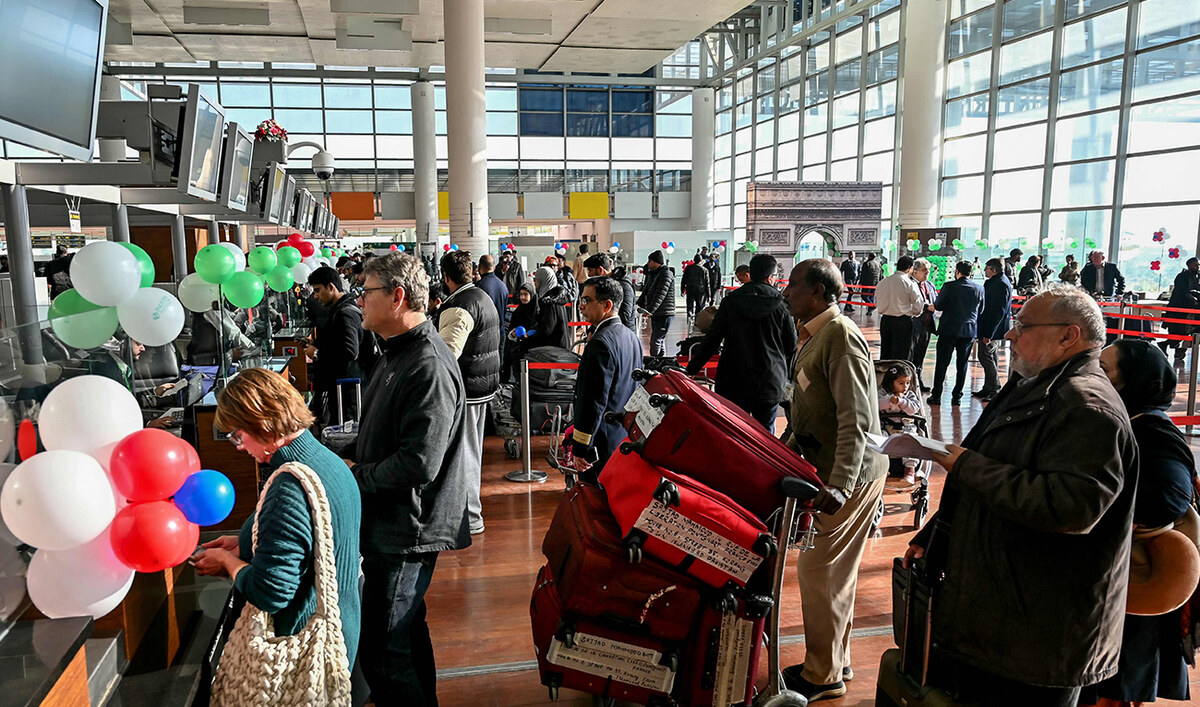
“This is the first time I am traveling with PIA,” Shumaila Rana, a 38-year-old passenger, told AFP before the flight took off from Islamabad for Paris at 12:40pm Pakistan time.
“I’m nervous and I’m having a lot of anxiety, but I’m hoping it’s gonna be a good flight.”
The airline said it had also made special arrangements for in-flight entertainment “through the Intranet Wireless Entertainment System.”
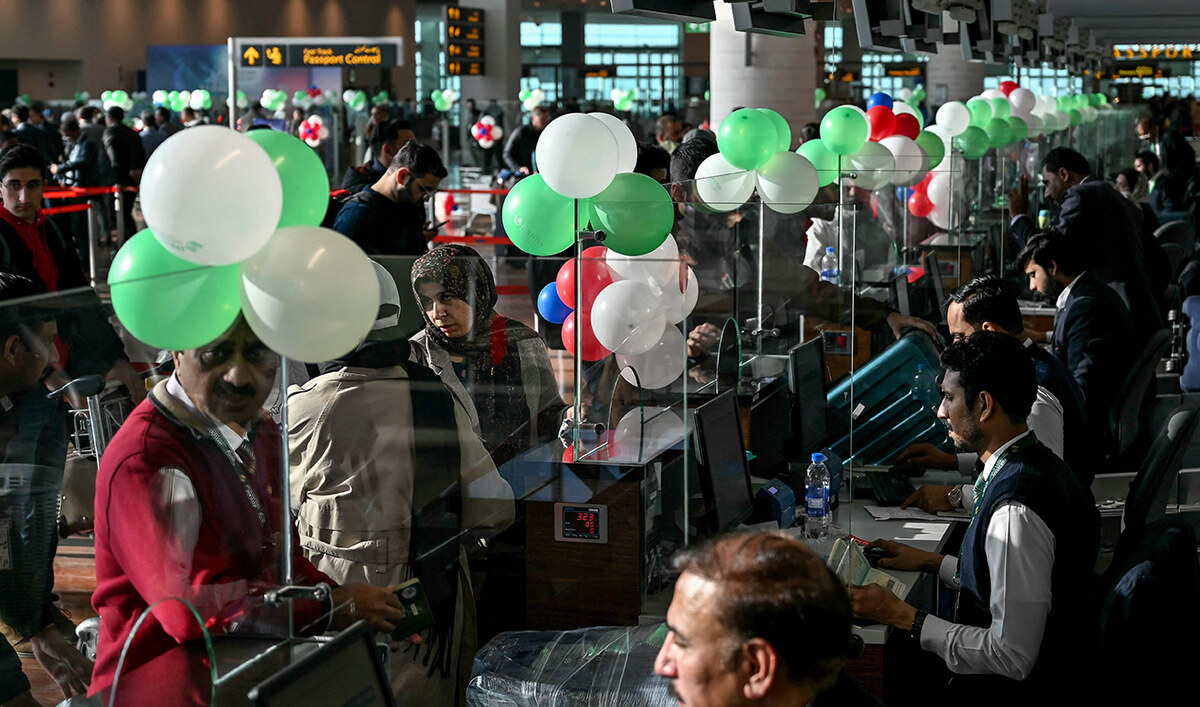
PIA, which employs 7,000 people, has long been accused of being bloated and poorly run — hobbled by unpaid bills, a poor safety record and regulatory issues.
Pakistan’s government has said it is committed to privatising the debt-ridden airline and has been scrambling to find a buyer. Late last year, a deal fell through after a potential buyer reportedly offered a fraction of the asking price.
The government hopes the opening of European routes, which officials expect will be followed by a similar announcement by the UK later this year, will boost its selling potential.
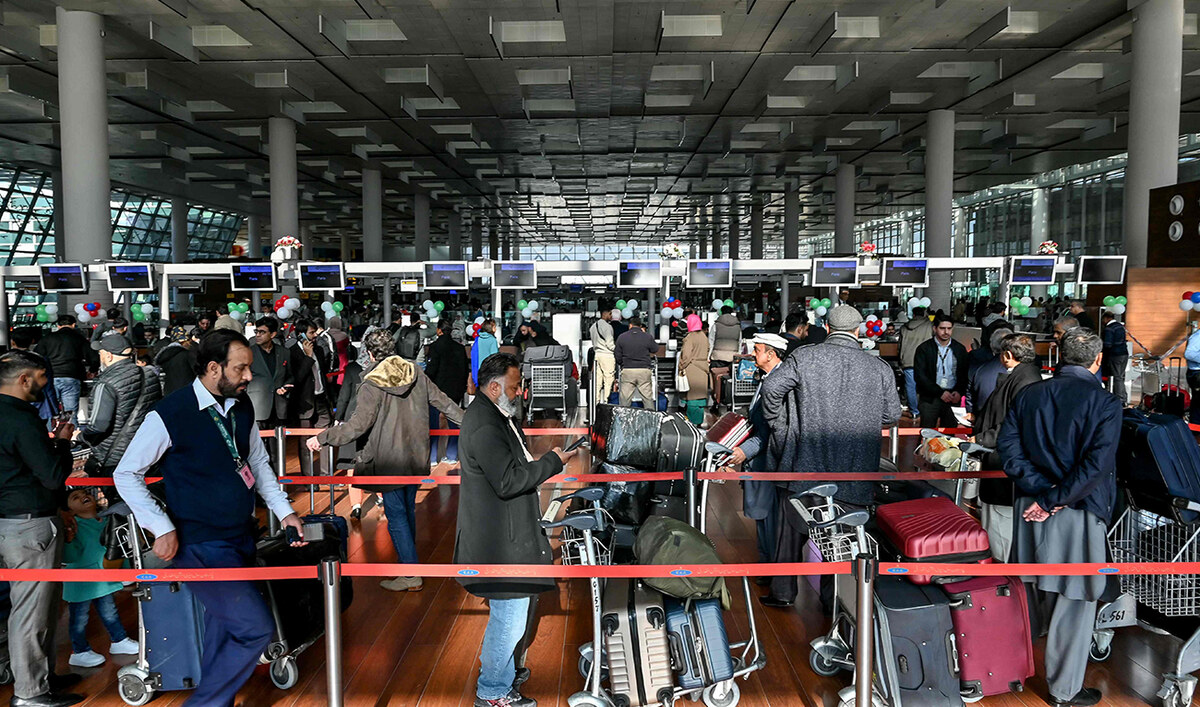
PIA posted losses of $270 million in 2023, according to local media. Its liabilities were nearly $3 billion, about five times the total worth of its assets.
In the same year, amid a national economic crisis, dozens of domestic flights were canceled when it could not afford fuel for its planes.
PIA came into being in 1955 when the government nationalized a loss-making commercial airline, and enjoyed rapid growth until the 1990s.


